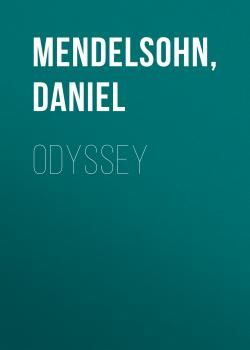Daniel Mendelsohn
Список книг автора Daniel MendelsohnThe Bad Boy of Athens: Classics from the Greeks to Game of Thrones
‘Mendelsohn takes the classical costumes off figures like Virgil and Sappho, Homer and Horace … He writes about things so clearly they come to feel like some of the most important things you have ever been told. ’ Sebastian Barry Over the past three decades, Daniel Mendelsohn’s essays and reviews have earned him a reputation as ‘our most irresistible literary critic’ (New York Times). This striking new collection exemplifies the way in which Mendelsohn – a classicist by training – uses the classics as a lens to think about urgent contemporary debates. There is much to surprise here. Mendelsohn invokes the automatons featured in Homer’s epics to help explain the AI films Ex Machina and Her, and perceives how Ted Hughes sought redemption by translating a play of Euripides (the ‘bad boy of Athens’) about a wayward husband whose wife returns from the dead. There are essays on Sappho’s sexuality and the feminism of Game of Thrones; on how Virgil’s Aeneid prefigures post-World War II history and why we are still obsessed with the Titanic; on Patrick Leigh Fermor’s final journey, Karl Ove Knausgaard’s autofiction and the plays of Tom Stoppard, Tennessee Williams, and Noël Coward. The collection ends with a poignant account of the author’s boyhood correspondence with the historical novelist Mary Renault, which inspired his ambition to become a writer. In The Bad Boy of Athens, Mendelsohn provokes and dazzles with erudition, emotion and tart wit while his essays dance across eras, cultures and genres. This is a provocative collection which sees today’s master of popular criticism using the ancient past to reach into the very heart of modern culture.
An Odyssey: A Father, A Son and an Epic: SHORTLISTED FOR THE BAILLIE GIFFORD PRIZE 2017
From the award-winning, best-selling writer: a deeply moving tale of a father and son’s transformative journey in reading – and reliving – Homer’s epic masterpiece. ‘My favourite classicist once again combines meticulous literary investigation with warm and wrenching human emotion – books like these are why I love reading’ LEE CHILD When eighty-one-year-old Jay Mendelsohn decides to enrol in the undergraduate seminar on the Odyssey that his son Daniel teaches at Bard College, the two find themselves on an adventure as profoundly emotional as it is intellectual. For Jay, a retired research scientist who sees the world through a mathematician’s unforgiving eyes, this return to the classroom is his ‘one last chance’ to learn about the great literature he’d neglected in his youth – and, even more, a final opportunity to understand his son.But through the sometimes-uncomfortable months that follow, as the two men explore Homer’s great work together – first in the classroom, where Jay persistently challenges his son’s interpretations, and then during a surprise-filled Mediterranean journey retracing Odysseus’ legendary voyages – it becomes clear that Daniel has much to learn, too: for Jay’s responses to both the text and the travels gradually uncover long-buried secrets that allow the son to understand his difficult father at last. As this intricately woven memoir builds to its wrenching climax, Mendelsohn’s narrative comes to echo The Odyssey itself, with its timeless themes of deception and recognition, marriage and children, the pleasures of travel and the meaning of home.Rich with literary and emotional insight, An Odyssey is a renowned author-scholar’s most revelatory entwining yet of personal narrative and literary exploration.



